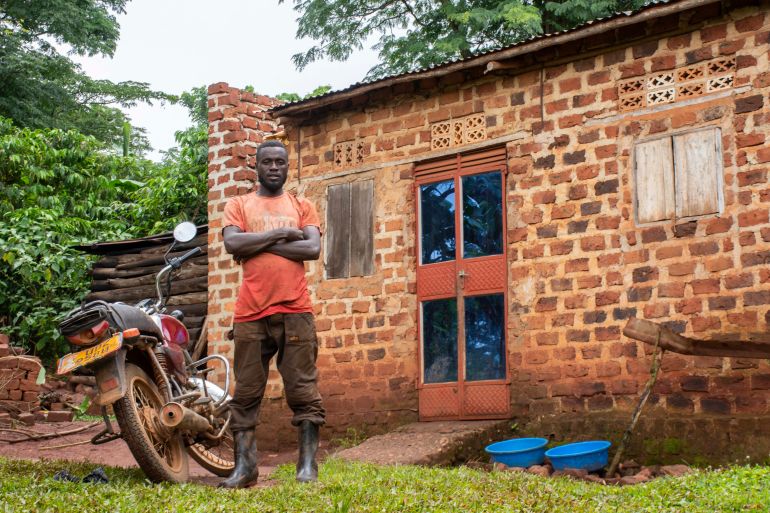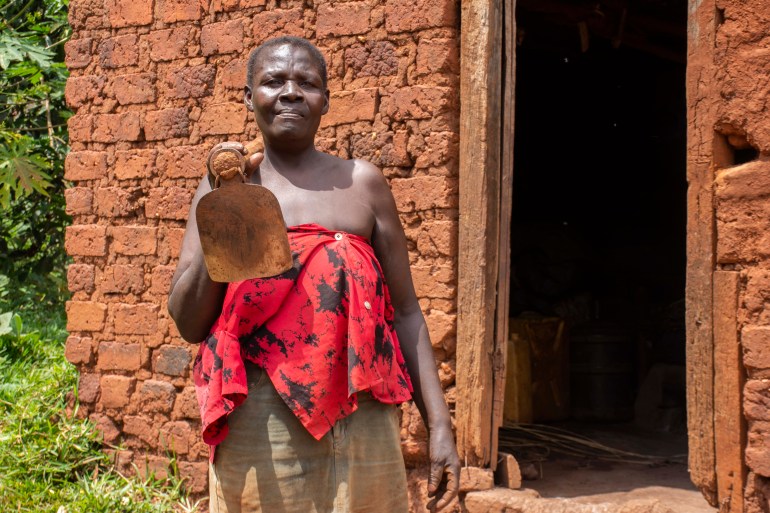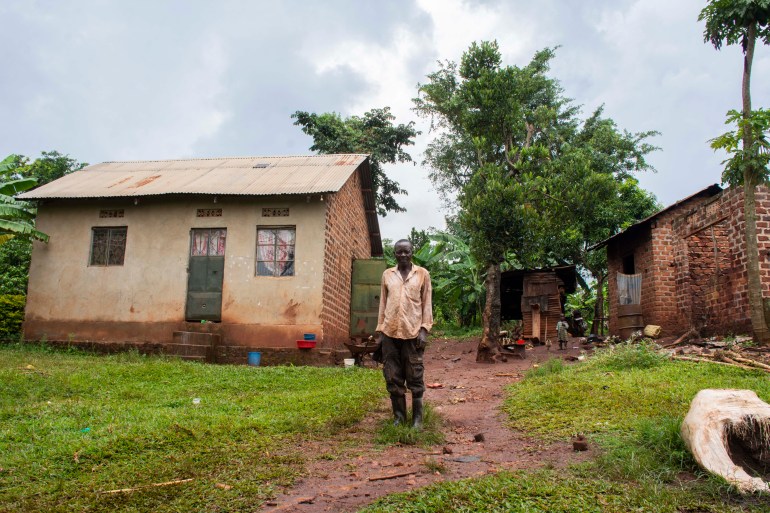In Uganda, scramble for land intensifies in fields surrounding Kampala
Urban expansion and the commodification of land are driving disputes in areas near the Ugandan capital.

Kampala, Uganda – On the edge of Kampala, the hard lines of the city start to blur, smudging into soft hills where the breeze rustles through banana leaves.
This is the district of Wakiso, which surrounds the Ugandan capital like a cradling hand. It is an in-between place, where village becomes city, and the thud of the hoe gives way to the roar of mechanical graders.
Keep reading
list of 4 itemsGaza’s mass graves: Is the truth being uncovered?
Tunisia: The migration trap
‘Bleak milestone’: UN says 3 million forced to flee in Myanmar conflict
Everybody here wants land. Brokers thumb through dog-eared title deeds. Surveyors prowl with their theodolites, measuring precise angles on rolling fields.
And last December, in Namayumba sub-county, a posse of heavyset men made camp in a grove of trees, signalling the start of a tussle that would leave 1,000 people in fear for their homes.
There was nothing unusual about this dispute. Land conflict has become commonplace in Wakiso, a district of more than three million people. And it is a recurring theme in many African countries as cities seep into their hinterlands, washing away established boundaries and old patterns of living.
In Ghana, vigilantes known as “land guards” violently enforce rival claims for land around Accra. In Ethiopia, the expansion of Addis Ababa has unearthed fraught questions of ethnicity and nationhood. In Zambia and Tanzania, survey data shows the growth of commercial farms owned by rich city-dwellers, especially in areas close to towns.
Nowhere else to dig
Florence Nakakande climbs the slope above her garden plot in Namayumba as raindrops glisten on the leaves. For most of her 62 years, she has dug and weeded and planted, coaxing beans and cassava from the earth, and laughter still comes lightly to her lips.
But she knew trouble was coming when she first saw kanyamas, the bouncers. They would jog through the village at sunset, their biceps rippling through their T-shirts, or patrol the road with sticks.
She had never known a problem like this, ever since she moved here as a newlywed. Back then, her husband had bought a kibanja, an interest on a small parcel of land, and they became tenants of a local family who owned more than 400 hectares (about 1,000 acres) in the area.
On paper, the law gives strong protection to kibanja-holders, who cannot be evicted as long as they pay a nominal rent, fixed by law at a few dollars a year. In practice, problems often arise when the landowner dies and his estate is sold or passed on.
That is exactly what happened in Namayumba. The landowner’s descendants split into two camps, each claiming rightful ownership. One branch of the family was now working with a surveyor to measure and subdivide the land, offering to help tenants get formal title deeds if they relinquished a portion of their plots.
Nakakande rejected the deal. She knew how easy it was to print fake documents at Nasser Road, a street in Kampala which is a hub of forgery. And anyway, her plot was a little larger than a football field.
“I’m a farmer,” she says. “If they cut my land, I will not have anywhere to dig.”
The kanyamas accompanied the surveyors as they measured out the fields, geometry and muscles working in unison. Whenever they walked past Nakakande’s house, they would gesture at her to leave.
Joachim Kyibabu, a young man who lives next door, says he was riding a motorbike one day when two cars pulled up on either side of him and a dozen kanyamas leapt out, accusing him of obstructing the process. He could escape only when a passer-by screamed for help.

Land as commodity
Land conflict in Wakiso is rife if recent headlines are anything to go by. A retired general sends armed men to secure a contested tract of land. Members of parliament build houses on a protected wetland. Two men are killed by an angry mob in one dispute; a pastor is stabbed in another.
Allegations of fraud swirl around the Wakiso land office, whose two branches handle nearly a million transactions a year. It was raided by a presidential anticorruption unit in 2018 and briefly closed in 2021 when a government minister accused officials of corruption.
Part of the pressure on land comes from population growth. Peter Ganjala, a neighbour of Nakakande who has lived in the area for 70 years, reckons that each plot now supports 10 people where it once fed four. The soil is losing fertility, he says, because many families no longer afford to leave land fallow.
Conflict is also fuelled by the expansion of Kampala as townsfolk seek space nearby for houses, factories and commercial farms.
“The demand drives unscrupulous people to try and find ways of getting money from their land,” says Rose Nakayi, a law lecturer at Makerere University who has also sat on a national commission of inquiry into land matters. “So you find instances of multiple sales, you find instances of impersonation.”
The old cultural meanings of land are being stripped away as it becomes a prized economic asset, she argues.
“Gone are the days when we would have a big mutaka [landowner] walking barefoot with a lot of respect … Today people don’t want to see unproductive land. They actually make arguments that if you can’t use it, avail it to those that can use it.”
The commodification of land is also changing the relationship between landlords and tenants. Longstanding proprietors with deep local roots are now selling to a new class of buyers who have the connections and resources to circumvent rules against evictions.
“Traditionally, landlord and tenant used to know each other, but now they don’t,” says Nakayi. “The person evicting colludes with the institutions such that they don’t enforce the law.”

Power and money
Nakakande heard the surveyors had been promised some of the land in exchange for their work. She did not know what they wanted the land for. But she was sure the law would not help the people unless they took action themselves.
In May, a group of 30 tenants, including Nakakande and her neighbours, went to a police station in Kampala after their complaints had been ignored by local officers. They were accompanied by representatives from one side of the landowning family, who had applied for a court order to stop the surveyors. Their protest was reported in the national press.
Then, at the end of May, the land minister came to Namayumba. Hundreds of people gathered in a clearing, the women wearing their smartest dresses with puffed sleeves. The crowd hollered and cheered as a succession of speakers made their case.
“This land has tenants,” said Judith Nabakooba, the minister, whose job is as much mediator as policymaker. “The Land Act talks about negotiation. It’s not [about] forcing somebody to share their kibanja.”
Only now that the minister had spoken did the tenants have hope the law would be enforced and their homes protected. This is how land disputes play out in Wakiso: a combative game of politics and brinkmanship, where the players matter as much as the rules themselves.
Matia Lwanga Bwanika, an opposition politician who serves as the elected chairman of Wakiso district, thinks the shortcomings of land administration are no accident.
“There is a deliberate attempt to mismanage land,” he says. “If a peasant has a problem of land, if he’s being displaced unfairly, as he rushes to police he will find a compromised [police commander], the judiciary the same, the political [representatives] the same.
“You find people who are holding power … don’t have land here around Wakiso. Now they use their two weapons – one is power, another one is money – to make sure that they own the prime land.”
Despite multiple requests, nobody from the Ugandan land ministry was available for comment on the issues raised by this story.
The debate about land is also entangled with questions of identity. Wakiso lies within the domain of the precolonial Buganda kingdom, but many powerful figures in the security forces come from far away in western Uganda, the home region of President Yoweri Museveni, who has ruled since 1986.
Opposition leader and singer Bobi Wine, who hails from Buganda, said in a recent speech, “Museveni thinks he is going to build his dynasty on the land of our ancestors in Buganda.”
His comments sparked a national debate about “tribalism” in government institutions, and police are now investigating him for alleged “sectarianism”.
Bobi Wine’s remarks reflect a widespread sentiment, although the ethnic politics of land is complex, especially given the long history of migration and intermingling between different regions of Uganda. The underlying drivers of land conflict in Wakiso are the same economic forces at work in other parts of Africa: urbanisation, population growth, and the commodifying effects of capitalism.
Back in the village, Nakakande and her neighbours wait for a resolution from the courts, where the two branches of the landowning family are arguing the case. Whatever the eventual outcome, they are caught in a maelstrom of change, where land is never wholly secure.